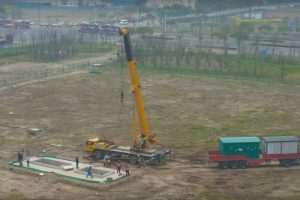Rimac has announced that it has started an energy storage division within its business, set to take on the likes of the Tesla Megapack.
As the use of renewable energy systems like wind and solar has grown in popularity, the need for energy storage systems to back up these renewables has grown as well. Now, to help meet the demand for these solutions in Europe, electric supercar maker Rimac has announced it will introduce its own offering, which will compete with products from Tesla, ABB, and numerous others.
According to Rimac, its new energy storage system (ESS) offerings will come in a couple of key variants, including “utility-scale, commercial & industrial applications, and highly integrated battery buffered charging solutions.” The Croatian company aims to begin production later this year, with deliveries beginning in 2024 and high-volume production starting in 2025. Rimac specified that “all [of its] products [will be] fully designed, developed, and produced in Europe.”
The upcoming ESS products will be produced at Rimac’s new Croatian campus, which will eventually have an energy output of 10 GWh annually.
“At Rimac, we have always been driven by innovation and a passion for pushing the limits of what is possible in the automotive industry,” says Rimac’s new Energy Director, Wasim Sarwar. “However, we recognize the importance of stationary storage solutions to power our planet sustainably. Given our track record in innovative battery technology, we believe we will play a vital role in building Europe’s future energy ecosystems, elevating it on the global stage.”
Rimac did not include many specifications for the upcoming ESS products, but it noted two primary upgrades that commercial buyers might be interested in. Foremost, Rimac promises a 40% smaller product footprint compared to industry standard, and second, its ESS offerings will reduce system energy losses by 50%.
Rimac is entering the energy storage market precisely at the right time, particularly in Europe. Many countries on the continent are looking to get out of fossil fuel use as fast as possible. This focus stems from not only environmental concerns but also the invasion of Ukraine by Russia, which has resulted in energy production in the Old World being shaken to its core.





